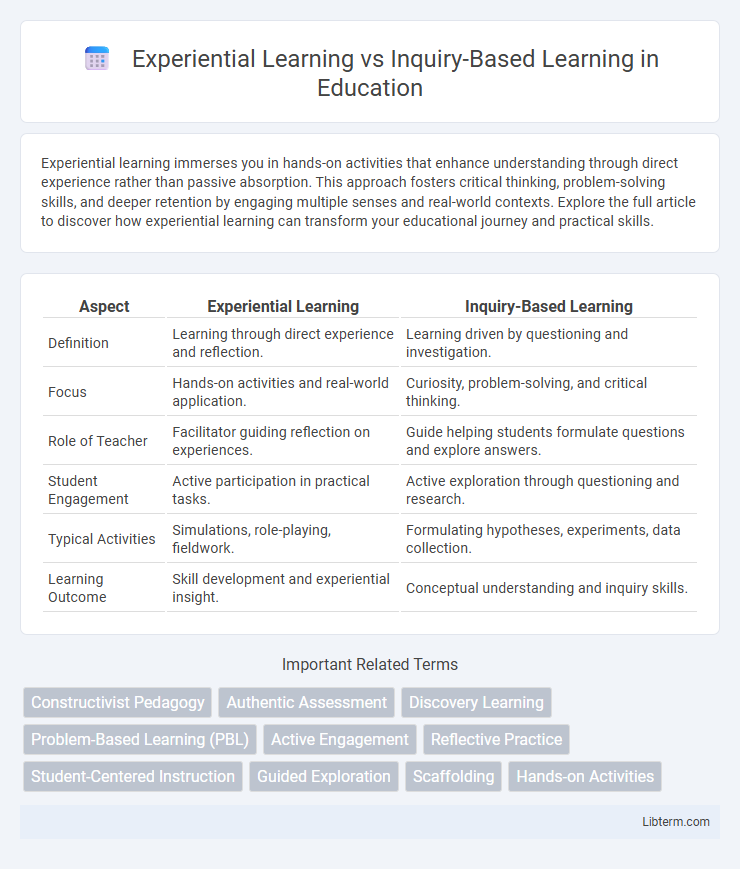Experiential learning immerses you in hands-on activities that enhance understanding through direct experience rather than passive absorption. This approach fosters critical thinking, problem-solving skills, and deeper retention by engaging multiple senses and real-world contexts. Explore the full article to discover how experiential learning can transform your educational journey and practical skills.
Table of Comparison
| Aspect | Experiential Learning | Inquiry-Based Learning |
|---|---|---|
| Definition | Learning through direct experience and reflection. | Learning driven by questioning and investigation. |
| Focus | Hands-on activities and real-world application. | Curiosity, problem-solving, and critical thinking. |
| Role of Teacher | Facilitator guiding reflection on experiences. | Guide helping students formulate questions and explore answers. |
| Student Engagement | Active participation in practical tasks. | Active exploration through questioning and research. |
| Typical Activities | Simulations, role-playing, fieldwork. | Formulating hypotheses, experiments, data collection. |
| Learning Outcome | Skill development and experiential insight. | Conceptual understanding and inquiry skills. |
Understanding Experiential Learning
Experiential learning emphasizes hands-on experiences where learners actively engage with real-world tasks to develop practical skills and critical thinking. This approach fosters deep understanding by allowing individuals to reflect on their actions and outcomes, promoting retention and application of knowledge. In contrast to inquiry-based learning, which centers on questioning and investigation, experiential learning focuses more on immersive participation and direct interaction with the environment.
Defining Inquiry-Based Learning
Inquiry-Based Learning centers on student-driven exploration where learners pose questions, investigate solutions, and construct knowledge through active engagement and critical thinking. It emphasizes the development of problem-solving skills and encourages curiosity by allowing learners to direct their own learning process rather than following a fixed curriculum. This approach fosters deeper understanding by integrating research, reflection, and collaboration to uncover new insights.
Key Differences Between the Two Approaches
Experiential learning emphasizes hands-on experience and reflection to deepen understanding, while inquiry-based learning centers on posing questions, investigating, and constructing knowledge actively. Experiential learning often involves concrete activities like simulations or real-world tasks, whereas inquiry-based learning involves critical thinking through hypothesis formulation and evidence analysis. Both promote active engagement, but experiential learning is rooted in doing and reflecting, and inquiry-based learning prioritizes exploration and discovery.
Core Principles of Experiential Learning
Experiential learning centers on gaining knowledge through direct experience, emphasizing reflection, active participation, and real-world application as core principles. This approach encourages learners to engage in concrete experiences, observe and analyze outcomes, and conceptualize lessons to enhance understanding. It contrasts with inquiry-based learning, which prioritizes questioning and problem-solving as primary drivers of knowledge acquisition.
Essential Elements of Inquiry-Based Learning
Inquiry-based learning centers on key elements such as questioning, investigating, and reflecting, encouraging students to actively explore and construct knowledge through hands-on experiences. Essential components include posing meaningful questions, designing and conducting investigations, gathering and analyzing data, and drawing evidence-based conclusions. This approach fosters critical thinking, problem-solving, and deeper understanding by engaging learners in a dynamic process of discovery and reflection.
Benefits of Experiential Learning
Experiential learning enhances knowledge retention by engaging learners in hands-on activities that directly connect theory with real-world practice. This approach fosters critical thinking, problem-solving skills, and emotional intelligence, promoting deeper understanding and personal growth. Learners develop adaptability and collaboration abilities through active participation, which better prepares them for professional and life challenges.
Advantages of Inquiry-Based Learning
Inquiry-based learning enhances critical thinking and problem-solving skills by encouraging students to ask questions and explore multiple solutions independently. This approach fosters deeper understanding and long-term retention of knowledge through active engagement and curiosity-driven investigation. Furthermore, inquiry-based learning promotes collaboration and communication, preparing students for complex real-world challenges.
Challenges and Limitations of Each Method
Experiential learning faces challenges such as resource intensity, requiring significant time, materials, and real-world settings that may not always be feasible in traditional classrooms. Inquiry-based learning limits include potential student frustration from open-ended problems and the need for skilled facilitators to guide inquiry without providing direct answers. Both methods demand careful balancing of guidance and independence to optimize student engagement and learning outcomes.
Integration Strategies for Educators
Integrating experiential learning and inquiry-based learning strategies enhances student engagement by combining hands-on activities with critical questioning techniques. Educators can design project-based tasks that encourage exploration and reflection, fostering deeper understanding and problem-solving skills. Utilizing collaborative group work and real-world scenarios creates a dynamic learning environment where students actively construct knowledge through experience and inquiry.
Choosing the Right Approach for Student Success
Experiential learning emphasizes hands-on experiences and reflection, fostering deep understanding through real-world application, while inquiry-based learning centers on students' curiosity and question-driven exploration to develop critical thinking and problem-solving skills. Selecting the right approach depends on educational goals, with experiential learning suited for skill mastery and practical engagement, and inquiry-based learning ideal for nurturing intellectual curiosity and independent investigation. Combining both methods can maximize student success by addressing diverse learning preferences and promoting comprehensive cognitive development.
Experiential Learning Infographic

 libterm.com
libterm.com